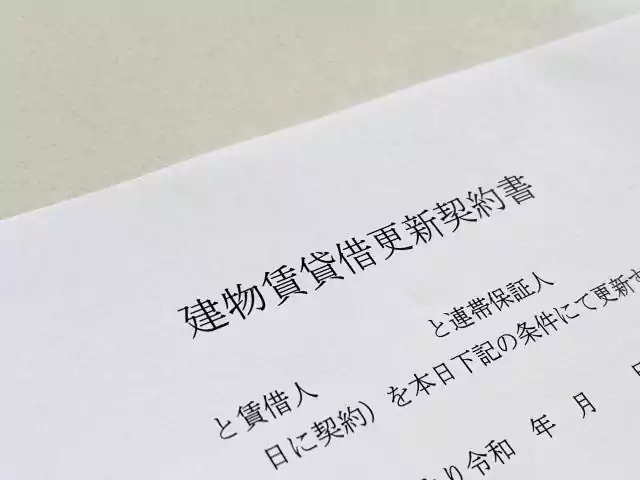Rentals are usually set to renew every two years. If you live in a rental, your contract will be renewed regularly. However, when it’s renewal time, some people may worry, “Should I renew my lease or move?” or “Maybe I’d like to move to a cheaper rental.”
So, this time, we will explain in detail the costs involved in rent renewal and moving. Please use this as a reference when comparing lease renewal and moving costs.
If you are searching for a new home instead of renewing your lease, please visit the Village House website (no renewal fees).
Contract Renewal Fees Are Approximately 2 Months’ Rent

The breakdown of expenses for contract renewal includes renewal fees, handling fees, and fire insurance, for which you’ll need about two months’ rent.
For example, if you renew a contract for a property with a rent of 75,000 yen, the renewal costs will generally be as follows:
| Renewal Fee(1 month’s rent) | ¥75,000 |
| Administrative Handling Fee(½ month’s rent) | ¥37,500 |
| Fire Insurance Premium | ¥20,000 |
| Total | ¥132,500 |
The renewal fee in the rental agreement is generally one month’s rent, but some properties require two months’ rent. Additionally, while most properties have rental contracts renewed every two years, some require renewal yearly.
Fire insurance is linked to the rental contract period, so if you renew your contract, you must pay two years’ worth of insurance premiums at the time of renewal. Please note that if you use a guarantee company, you must also pay the guarantee company’s renewal fee.
Pros of Rental Contract Renewal
- No need to prep for moving
To move, you should make various preparations, such as getting a quote from a moving company, arranging for a moving company, completing procedures at public offices, and canceling utility bills. Also, it takes about 1 to 2 weeks to pack for the move. So, if you are busy with work and cannot afford to move, renewing your contract may be a good idea.
- Possibility for Rent Negotiations
You might be able to reduce your rent during contract renewal successfully. We will discuss the key points of rent reduction negotiations later. Still, as a landlord, the disadvantages of having a vacant room are more significant than reducing the rent, so it may be easier to discuss rent at the time of contract renewal.
- No need to change your lifestyle
When you move, getting used to your new environment will take some time. Therefore, living in a familiar environment without changing your lifestyle can be mentally and physically beneficial.
It Costs About 5 Months’ Rent to Move Including Moving Fees

You will need about 5 months’ rent to move to a new home. For instance, if you move to a property with a rent of 75,000 yen, the initial costs generally required are as follows:
| Security Deposit | ¥75,000 |
| Key Money | ¥75,000 |
| Agency Fee | ¥75,000 |
| Guarantor Company | ¥37,500 |
| Fire Insurance Premium | ¥20,000 |
| Key Exchange Fee | ¥15,000 |
| Advance Rent | ¥75,000 |
| Moving Fee | ¥50,000 |
| Total | ¥422,500 |
The necessary costs for moving differ depending on the time and property.
For example, many properties do not require deposits or key money during the off-season from May to September. Likewise, transportation charges for moving vary between busy and off-season, so if you move during the off-season, the sum may be less than the above amount.
Moreover, when you move out of a property, if the interior is filthy or the appliances are damaged, you may be required to pay to repair the property to its original condition. If the rent only goes down by about 5,000 yen, renewing would be cheaper.
Pros of Not Renewing Contract and Moving
- Find a rental with better conditions
Perhaps poor sunlight or troubles with neighbors make you unhappy in your current home. In that case, the timing of moving may be a chance to shift to a better environment. Also, if you have a difficult long commute, moving closer to your workplace will reduce the stress of commuting.
- Reduce rent burden
If your income is unstable and you want to reduce the rent burden, one option is to move to a cheaper property. Although you will need to pay a certain amount when moving, the lower rent will save you a lot of money in the long run. You will have more money to spend on savings and hobbies.
- Chance to declutter
Another benefit of moving is that you can get rid of unnecessary items. We are so busy every day that we often put off organizing things. Moving is the perfect chance to declutter.
Cancel Your Rental Contract Anytime

Even if your rental contract is for two years, no rule says you must live there for two years. However, watch out; depending on the particular terms and conditions of the agreement, you may be charged a penalty if you cancel during the contract period.
For example, if you move for unavoidable reasons within two years, there is usually a penalty fee equal to one month’s rent. The penalty fee varies depending on the property and the tenancy period, so please check the terms and conditions regarding cancellation when signing the contract.
However, if you have a fixed-term lease contract, you cannot cancel it during the contract period. If you are uncertain of the details of your contract, it is best to check the rental agreement.
What are the Key Negotiation Points to Consider for Rent Reduction When Renewing?

If you want to renew your contract but reduce your rent, why not negotiate for a lower rent at your renewal? Here are three key points to help you successfully negotiate a rent reduction.
- Compare the rent of other similar properties
First, before negotiating a reduction in rent, search the internet for properties with similar conditions to the property you are currently living in and research the market price of rent. If the rental you are presently paying for is more expensive than the property you found, you can use that to negotiate a lower rent.
You can also use worsened rental conditions, such as a newly built tall building blocking your sunlight or a nearby shopping mall closing, as grounds for reducing your rent.
- Don’t go over ¥3,000
Generally, when negotiating lower rent, aim for a maximum of 3,000 yen. You need to be careful because if it is too high, there is a possibility that the reduced amount will not be accepted. If the reduction is around 3,000 yen, landlords might find keeping their current tenants longer more profitable than having a vacant property.
- Tell them you’ll stay long-term
When negotiating for a lower rent, make sure to let your landlord know that you intend to stay there for a long time. Landlords want to avoid having vacant rooms as much as possible. So, if you say you will stay for a long time, there is a high possibility they will decrease it!
It is easier to negotiate your rent when you use specific reasons to stay a long time, for instance, “I like it here because it’s close to family” or “I’d like to stay with my current job.”
Look for a Place with Cheap Rent

If you decide not to renew and choose to move, why not look for cheaper rent? You can also save on upfront costs if the property meets the following points.
How to reduce initial costs
- Look for rentals without a security deposit and/or key money
- Search for rent-free properties
- Choose a real estate company with low brokerage fees
- Check during low season (May to September)
If your only reason to move is the contract renewal fees, then you will actually save on expenses if you stay with your current home.
However, if there are things you are dissatisfied with in your current apartment or you would like to lower your rent, consider moving before incurring contract renewal fees.
Village House has more than 1,000 properties in 47 prefectures nationwide with rents ranging from 20,000 yen. There are also one-month rent-free options. Our properties have no security deposits, key money, handling fees, or renewal fees, so you can save on moving costs. If you are looking for a property, check out Village House.
*Depending on the contract details and/or screening results, a security deposit and a joint guarantor may be required.
**Special offers may vary depending on the property.
Related articles:
- How Much Does Moving Out Usually Cost? 7 Tips to Reduce Move-Out Fees!
- How Much Does It Cost To Move In Japan – Top 5 Biggest Expenses
- Want to Move but Can’t Afford the Initial Costs? Here’s What You Can Do!
- Giving Proper Notice before Moving Out



